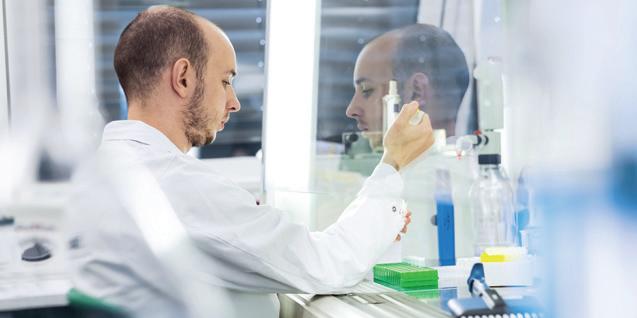
11 minute read
Economic aspects
Cornerstones of our organization’s success.
Applied research is the basis for all of ERBER Group’s activities, and everyone benefi ts as a result: business partners, customers and end consumers. We place a great deal of trust in valuable collaborations, promote scientifi c work and, at the same time, we develop state-of-the-art knowledge. Sometimes it is in the long term, as many university graduates are now our valuable employees.
Advertisement
Our good reputation is based on research and development 103-1, 103-2
Our company was founded in 1983 as ERBER KG and then it was known as BIOMIN GmbH. It has been operating as the ERBER AG holding company since 1996, continues to be family-owned, and is seen as an innovative world leader in the field of mycotoxin risk management. In FY18, with approximately 1,400 employees and a turnover of over 330 million euros, ERBER Group has grown. The original goal, the almost mechanical “double in five years” approach, was linked to a qualitative goal: to transform from a small mid-tier business into a global player and hidden champion.
To continue to remain competitive, maintain our innovation leadership and to continue to develop what we have achieved as well as our economic success, we invest in our employees’ education and training as well as in cutting-edge research labs and production facilities. For us to achieve the ambitious growth goals we have set out for ourselves, investing in research and development is essential. It is the basis of ERBER Group’s economic success.
To ensure a forward-thinking approach, it is also extremely important for ERBER Group to have a good reputation. ERBER Group espouses business activities based on integrity and which, from an ethical and a legal perspective, meet all applicable legal requirements. For this reason, ERBER Group developed and introduced a Code of Conduct in 2018; it can be found on our website. All employees have to adhere to it without exception, and in the future it will be integrated into the contracts we have with our business partners.
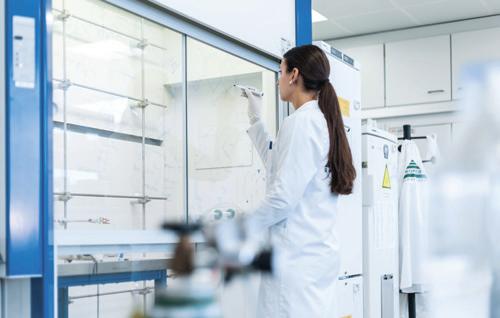
Research and Development: Around 170 scientists and developers are employed at our business sites worldwide.
Ensuring a forward-thinking approach 103-1, 103-2, 200
Research and development are key to ERBER Group’s success. We see ourselves as an organization of experts with around 170 scientists and developers at business units around the globe. Additionally, we cooperate with over 250 research institutes and universities worldwide. Our Campus Tulln, with its institutes of the Austrian University of Natural Resources and Life Sciences (BOKU), the Austrian University of Veterinary Medicine, Universities of Applied Sciences and the Austrian Institute of Technology (AIT), is our center of scientific research activities driven by international cooperation.
Every division has its own in-house research and development department (R&D)
BIOMIN is a global technological leader in mycotoxin risk management, offering many innovative solutions for inactivating these fungal metabolites and supporting animal health sustainably with its products. An additional focus in its research and development activity
is to support the complex digestive system, which is the most significant barrier in terms of animals’ immune systems. Solutions such as probiotic or plant-based additives promote gut health and significantly reduce the number of interventions such as treatments with antibiotics.
ROMER offers testing and diagnostic services to analyze contaminants in food and feed; these include allergens, mycotoxins, pathogens, genetically modified organisms (GMOs) and residues of medicinal products. When developing new testing methods, we place a great deal of emphasis on sustainability and user protection. As a result, in the last four years we took an entire product line for analyzing mycotoxins and changed the extraction agents from organic to water-based materials.
SANPHAR specializes in biosafety as well as preventative and therapeutic products for animal health.
Innovationskraft: Wir streben nach ständiger Verbesserung und maximaler Qualität.
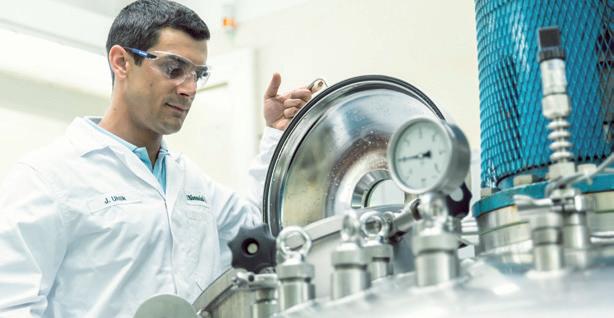
4.3% of turnover dedicated to R&D in 2018
~237 scientific publications per calendar year EFB (ERBER Future Business) is investigating new approaches to food and feed safety and health. The focus of its research lies on developing new vaccinations and innovative enzyme-based solutions for food and feed.
To maintain our position as a technological leader, we have set the goal of investing at least 4% of our annual turnover in research and development. In the past four years, it was between 3.9% and 4.3%. Research expenditures at BIOMIN alone have increased by 76% since 2015.
Research expenditures as a percentage of turnover:
FY14
4.1%
FY 15 FY16 FY17 FY18
3.9%
4.2% 4.3% 4.3%
To prove the efficiency of new products and to determine their safety and the mechanisms of actions, feeding trials take place in our feed centers (Center for Animal Nutrition – CAN). Our “further development teams” conduct these trials in cooperation with universities and private testing facilities. We organized around 50 trials of this kind in 2018, of which 33 feeding trials took place in BIOMIN’s own testing centers.
Over 50,000 pieces of data on weight from approximately 13,000 animals were collected and more than 4,000 samples were sent for additional testing. At the same time, we refer back to laboratory testing models and focus a great deal on statistically safeguarded testing procedures to keep the number of feeding trials to a minimum.
In addition to supporting academic research by students, attending international conferences regularly is one of the cornerstones of our innovation network – the employees from the BIOMIN division alone attended a total of 115 international conferences in the 2017/2018 reporting years. Our position as an innovation leader is strengthened by publications in international scientific journals as well as through presentations and talks at international conferences. As a result, BIOMIN published a total of 476 scientific papers in the 2017 & 2018 calendar years.
Customer events, such as the World Nutrition Forum, which began in 2004 and has been
Scientific papers (BIOMIN):
Calendar year 2017 2018
Scientific papers
212
264
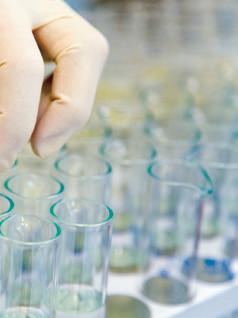
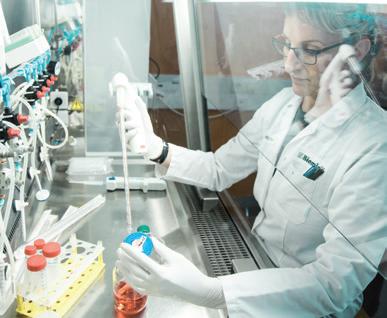
Innovation: Collaboration with over 250 research institutes and universities on the development of new products and services.
taking place once every two years ever since, serve as a platform for information exchange between internationally renowned scientists and experts from business, the industry and the authorities. The World Nutrition Forum is a scientific congress on agriculture, livestock production, animal health and nutrition, with around 800 guests attending presentations on each topic. Another such event is the Antibiotic Free Days, with over 300 participants.
A system for managing ideas and innovation, implemented globally as a database, gets all employees involved in designing and creating processes, services and products in an active and creative way. A total of 1,496 ideas were submitted during the reporting period; following an evaluation and review process, 476 ideas were implemented globally. In 2018, nearly one third of all ERBER Group employees (29%) submitted at least one idea. Our goal is to have every ERBER Group employee submit one idea per fiscal year.
We protect our know-how and use it to benefit as a business through intensive state-of-the-art research (approximately 180 experiments in 2018) and patents, among others. In 2018 alone ERBER Group received over 300 patents, with the number of patents increasing by around 9% every year. Increase in the number of issued patents per calendar year::
Calendar year 2016 2017 2018
Patents 6% 11% 9%
Our 4.0 projects touch on the future of agriculture, focusing on new technologies (big data, digitization).
Examples of these projects include equipping testing centers with sensors, an app for predicting mycotoxin contaminants based on machine learning as well as the new omics technologies; thanks to DNA and RNA sequencing, they provide insight into the physiological metabolic processes in animals as well as the composition of and changes to gut flora. Large sets of biological data can be analyzed through bioinformatics technology.
Galenic formulation deals with the newest technologies which allow us to transport the active ingredients we developed, so that their efficacy is not compromised, to the part of the livestock’s digestive tract where they are needed.
300 In 2018 alone ERBER Group received over 300 patents
Anti-corruption
102-11, 103-1, 103-2, 205-2, 206-1, 307-1, 417-2, 417-3, 419-1
It is of the utmost importance to ERBER Group to maintain the good reputation it has built up in its markets and among its stakeholders over many years, and to protect its subsidiaries and brands from developing a negative image. This is why ERBER Group set up an Internal Auditing department in 2016. It is an integral part of ERBER Group’s corporate governance, aligning with the internationally applicable Code of Conduct applicable to this profession and taking all professional standards into account.
The Internal Audit department is in charge of identifying the risks that could prevent a company from achieving its goals and ensuring that Management is aware of these risks. It also makes proactive recommendations on what improvements could reduce these risks. Management relies on Internal Audit to objectively determine and inspect the effectiveness and efficiency of corporate governance, risk management and control processes within the Group.
Internal Audit provides security with regard to corporate governance, risk management and control processes so that the company meets its strategic, operating, financial and compliance objectives. It is a catalyst when it comes to improving the company’s effectiveness and efficiency by inspecting and recommending measures based on analyses and reviews of data and business processes. It is dedicated to promoting integrity and accountability, doing its best to provide Management with objective reporting from an independent source.
During the reporting period, there were no violations in environmental law, labor law, anti-trust law, in social and economic matters, product designation, competition as well as marketing and communication. It is ERBER Group’s goal to continue to have a perfect track record of no violations in these areas.
The Code of Conduct & Whistleblowing System In 2018, the Executive Board and the Supervisory Board drew up a Business Code of Conduct which is applicable for the entire ERBER Group and its subsidiaries. Owners, managers and employees are responsible for behaving in a manner which aligns with the Code of Conduct’s principles. It is a mandatory guideline and set of instructions which provides information on how ERBER Group employees are to act during dayto-day business interactions and includes rules on the following:
Fair and respectful treatment of one another Environmental protection, human resources, occupational health and safety Fair competition, donations and sponsoring Anti-corruption and preventing conflicts of interest Giving and receiving gifts and other gratuities The use of resources, information and social media Behavior and etiquette for ERBER Group employees Conflicts of interest, personal relationships at work
ERBER Group has a zero-tolerance policy with regard to corruption and bribery. It decisively counteracts all attempts at corruption in all of its divisions and in every country. This applies to all activities with business partners and authorities as well as activities within the Group.
Total number and percentage of members in the controlling body who know about the organization’s anticorruption rules and procedures. Period FY17 FY18
Number 5 5
Percentage 100 100
Employees may not offer bribes and may not resort to intermediaries such as agents, consultants, sales partners or other business partners to take bribes. Both active and passive corruption, as well as bribery, is prohibited. Every relationship with public officials must be strictly in accordance with the governing laws and provisions of the country whose laws and provisions are binding on such public officials. Business-related and personal interests are to be strictly separated from one another.
Employees who witness illegal activities and violations of the Code of Conduct must report the incident to their supervisors immediately. The report may be made in writing or verbally. Supervisors are required to document the incident and submit a report.
To ensure that these ethical principles are also followed worldwide, a whistleblowing system was set up in addition to the Code of Conduct. This system, known as "ERBER Speakout" , allows employees to report incidents via email, web platform, by telephone or mail.
The person reporting the incident can rest assured that they will remain anonymous. The purpose of this communication tool, managed by KPMG, is to report illicit activities which may be subject to prosecution under criminal and corporate law.
In September 2018, 1,283 employees around the world (94% of all ERBER Group employees) were informed about the existence of the whistleblowing system and the Code of Conduct per email, through the database, electronic and hard copy versions of the employee newsletter as well as during local events (town hall meetings). The documents in question were made available to employees in German, English and Brazilian Portuguese. By the end of FY18, the Code of Conduct was sent to leading employees and managers for verification. It is ERBER Group’s goal for the future to have 100% of employees confirm receipt of the Code of Conduct and to also have them read it. Internal audits will be used to verify whether employees actually read the Code of Conduct. These audits will be conducted on all levels: from management to the working area.
Anti-corruption measures were not introduced until FY18. Compulsory training courses are already being planned for managers in FY19. These cours-es concern General Management, Sales, Purchasing, Finance and Research & Development.
For the members of the controlling body (ERBER AG’s Supervisory Board), there will be no additional training on anti-corruption measures. Pursuant to the Austrian Corporation Act, one of the prerequisites for being appointed as a member of the Supervisory Board is knowledge of anti-corruption measures; additionally, this also presupposes personal ac-countability. Therefore, we assume that the controlling body is 100% knowledgeable about the content of the Code of Conduct.
Our business partners can find the Code of Conduct on the ERBER Group website. As a way to tackle corruption, ERBER Group’s goal is to have the Code of Conduct become an integral part of every new standard contract in the future and, when renewing these contracts, the parties will have to agree to adhere to it once again.






